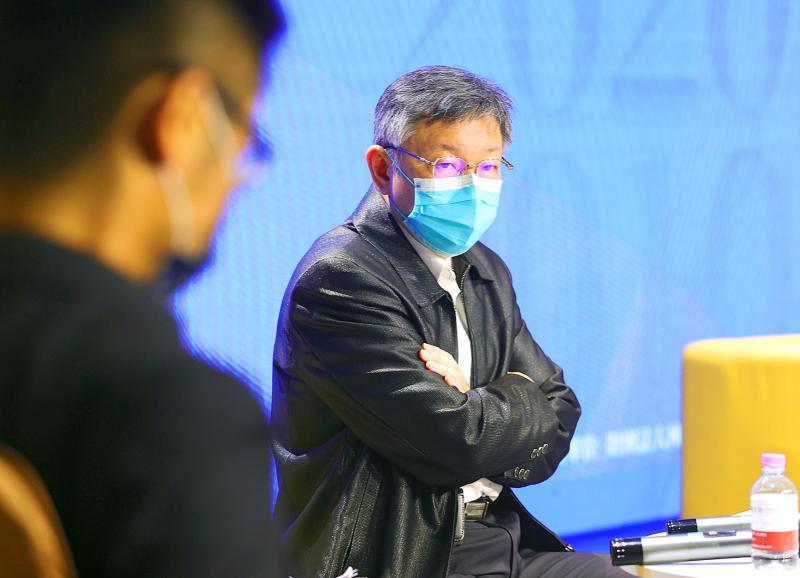The struggle that young Taiwanese face to purchase a home in Taipei is a problem of intergenerational justice, Taipei Mayor Ko Wen-je (柯文哲) said yesterday
Ko made the remarks at a forum in Taipei hosted by the Chinese Nationalist Party (KMT)-affiliated National Policy Foundation. The event, titled “A Future That Cannot Be Afforded,” was the second in the foundation’s three-part forum series titled “Vision of Taiwan in 2030.”
Ko, KMT Chairman Johnny Chiang (江啟臣) as well as experts and youth representatives were invited to discuss the issues of low salaries, intergenerational justice and housing justice. KMT Deputy Secretary-General Ko Chih-en (柯志恩) moderated the discussion.

Photo: CNA
During the segment on intergenerational justice, Ko Wen-je, who is chairman of the Taiwan People’s Party, spoke of the importance of maintaining fiscal discipline and environmental awareness in tackling the issue.
He said that long-term interests should not be scarified for short-term gains, national interests should not be sacrificed for personal gain and the interests of the majority should not be sacrificed for those of the few.
“If you uphold these values, in theory there will be no problems with policy,” he said.
“When we talk about intergenerational justice, the first thing that should be brought up is fiscal discipline,” he said, adding that central and local governments have accrued sizeable debts that must be paid back by future generations.
On the environmental side of the issue, he said that Taiwan’s economy developed rapidly for a period, “because we made money that other people did not dare to make,” and that future generations would be facing the effects of industries that have been large sources of pollution.
Ko Wen-je also said that “housing justice is essentially a problem of intergenerational justice.”
It is “not in line with [the concept of] intergenerational justice” that young Taiwanese today struggle to own a home in Taipei, whereas members of his generation could become homeowners a few years after graduating from university, he said.
The government’s role in reallocating resources is key, Chiang said, adding that while the government has done a lot in that regard, issues such as low salaries and young people’s inability to afford homes show that there is still room for improvement.
To address the root causes of issues of intergenerational justice, the government must listen to the problems faced by different generations, Chiang said.
On the topic of housing justice, Ko Wen-je said that the construction of public housing and the distribution of rental subsidies could help, but added that reforming tax rates — specifically those targeting people who own multiple properties — is the most needed.
The foundation said that a survey it commissioned found that 48.4 percent of people were worried that the nation would go bankrupt, compared with 39.9 percent who said they were not worried.
Conducted on Wednesday and Thursday last week by Apollo Survey & Research Co, the survey collected 1,081 valid responses and had a confidence level of 95 percent and margin of error of 3 percentage points, it said.
The final session of the “Vision of Taiwan in 2030” forum series is to focus on the environment and sustainability, the foundation said.
Additional reporting by CNA

Eight restaurants in Taiwan yesterday secured a one-star rating from the Michelin Guide Taiwan for the first time, while three one-star restaurants from last year’s edition were promoted to two stars. Forty-three restaurants were awarded one star this year, including 34 in Taipei, five in Taichung and four in Kaohsiung. Hosu (好嶼), Chuan Ya (川雅), Sushi Kajin (鮨嘉仁), aMaze (心宴), La Vie by Thomas Buhner, Yuan Yi (元一) and Frassi in Taipei and Front House (方蒔) in Kaohsiung received a one-star rating for the first time. Hosu is known for innovative Taiwanese dishes, while Chuan Ya serves Sichuan cuisine and aMaze specializes

Taitung County is to launch charter flights to Malaysia at the end of this year, after setting up flights to Vietnam and Thailand, the Taitung County Government said yesterday. The new charter flight services, provided by low-cost carrier Batik Air Malaysia, would be part of five-day tour packages for visits to Taitung County or Malaysia. The Batik Air charter flight, with about 200 seats, would take Malaysian tourists to Taitung on Dec. 30 and then at 12:35pm return to Kuala Lumpur with Taiwanese tourists. Another charter flight would bring the Taiwanese home on Jan. 3 next year, arriving at 5:30pm, before taking the

Taiwan High Speed Rail Corp. (THSRC) plans to ease strained capacity during peak hours by introducing new fare rules restricting passengers traveling without reserved seats in 2026, company Chairman Shih Che (史哲) said Wednesday. THSRC needs to tackle its capacity issue because there have been several occasions where passengers holding tickets with reserved seats did not make it onto their train in stations packed with individuals traveling without a reserved seat, Shih told reporters in a joint interview in Taipei. Non-reserved seats allow travelers maximum flexibility, but it has led to issues relating to quality of service and safety concerns, especially during

An exhibition celebrating Taiwan and Japan’s comic culture opened on Saturday in Taichung, featuring a section that explores Taiwanese reproductions of Japanese comics from when martial law limited Japanese representation. “A Century of Manga Culture: An Encounter of Taiwan and Japan’s Youth” held its Taiwan opening ceremony at Taichung’s National Taiwan Museum of Comics after an initial one-month run in Japan’s Kyoto International Manga Museum between May 24 and June 24. Much like the Kyoto exhibition, the show mainly celebrates the comic connection between Taiwan and Japan through late Taiwanese comic book